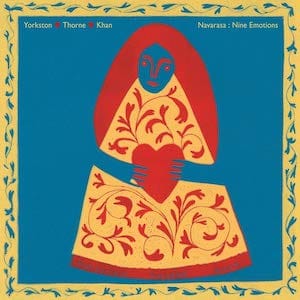 Yorkston/Thorne/Khan – Navarasa : Nine Emotions
Yorkston/Thorne/Khan – Navarasa : Nine Emotions
Domino – 24 January 2020
The latest record by Yorkston/Thorne/Khan might be described as a concept album. It has none of the false grandeur of the progressive behemoths or folk-rock pseudo-epics of forty years ago, and none of its nine tracks are merely structural – each stands alone as a valid showcase of the trio’s many talents. But while there is no empty posturing or clumsy intellectualising at work here, Navarasa most definitely has a strong conceptual thread running through it. The group – now on their third album together – are keen to point this out, although they might use the term structure rather than concept. The album’s title refers to the subcontinental principle that there are nine emotions which inform the creative process and are present in all artforms. This structure underpins the entire album and is partly responsible for the sheer range and scope of the music on offer here: where other concepts could be constrictive, this one is liberating.
Given Navarasa’s south Asian inspiration, it might be tempting to assume that its sound would rely more heavily on Suhail Yusuf Khan’s sarangi, an Indo-Pakistani stringed instrument which approximates the human voice in a way that veers between the uncanny and the jubilant. But that is not necessarily the case. As on previous albums, all three members are given their space. But despite the individual skills on show, the important thing is the interplay. While the musical rapport between Khan’s sarangi, Jon Thorne’s upright bass and James Yorkston’s guitar has always been natural and fluid, their shared craft has now been honed to the extent that the disparate sounds and influences now come together with an almost inevitable quality. Opener Sukhe Phool (which reflects on the emotion of karuna, or sorrow) begins with a mournful sarangi and advances on a minimal bass motif. Khan’s vocals give way to Yorkston’s as the song becomes a beautiful, sad dialogue punctuated by the simplest of piano refrains.
The Shearing’s Not For You deals with the neglected emotion of disgust. Yorkston gives this traditional Scottish song a tender rendition and Khan’s sarangi, far from sounding out of place, seems almost to emerge from the landscape of the song. Thurmi Bhairavi, a slow and creeping meditation on anger, is a showcase for Thorne’s brooding bass and Khan’s increasingly confident singing. The ten-minute Westlin Wind (featured in the latest Folk Show here), which examines surprise and wonder, is a confident reimagining of a Robert Burns poem, sung partly in Purbi, an old Hindi dialect. The many cultural strands that inform the song – Scottish literary tradition, Islamic devotional music, Hindustani learning – emerge as a beautifully coherent whole, melodic and meandering, and strangely soulful.
Song For Oddur is a Jon Thorne composition, and his tough but fragile vocal delivery, often verging on spoken-word, is a delightful surprise, as is the combination of harmonica, piano and acoustic guitar, which gives way to Khan’s sarangi as the song reaches its conclusion. The North Carr is an example of Yorkston’s considerable talent as a composer. It is a glimmering instrumental piece, reflecting on laughter, that becomes more unfettered as it progresses, like a conversation that becomes more convivial as the wine flows.
The idea of music as a form of conversation is never far from the surface. The Twa Brothers, another traditional song arranged by Yorkston, becomes a conversation between eastern and western singing styles, with Khan’s rhythmic non-verbal vocalisations reacting to Yorkston’s unaccompanied singing while a third voice – a field recording of a crow – lends the piece its atmosphere of terror. The dialogue between east and west continues on Waliyan Da Raja, where Khan’s rendition of a Punjabi-language praise song is propelled into an almost trance-like state by Yorkston’s forceful guitar. The album’s closer – and at twelve and a half minutes its longest track – is Darbari, a still and meditative pool of a track that takes inspiration from both Asian and European musical forms, and in particular the drone. Yorkston’s Swedish nyckelharpa feels at home next to the sarangi, and Thorne’s bass playing has a loose, improvisational feel, moving confidently between the impressionistic and the minimalistic. The track – and by extension the album as a whole – achieves a kind of serenity that is certainly spiritual but is somehow completely secular and entirely inclusive. Its influences are clearly visible, but the way those influences are put together creates a kind of music that is original, exciting and wholly unique.
Navarasa : Nine Emotions is out now.
Upcoming Yorkston/Thorne/Khan Scottish live dates
22nd January – Celtic Connections @ Drygate Brewery, Glasgow – Album Launch
21st March – CatStrand, New Galloway
22nd March – Summerhall, Edinburgh
23rd March – Perth Theatre, Perth
24th March – Eden Court, Inverness
25th March – The Old Bridge Inn, Aviemore
26th March – The Barn, Banchory
27th March – Tolbooth, Stirling
28th March – Eastgate Theatre, Peebles
https://www.yorkstonthornekhan.com/
Photo Credit: Jon Pountney
